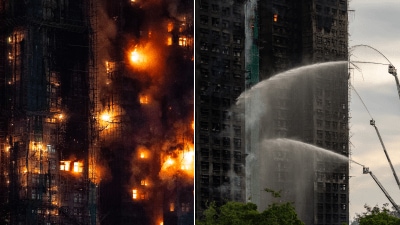Tanker drivers rule corridor of death
VADODARA, June 18: Hundreds of greenhorn tanker drivers are turning the Mehsana-Vapi golden corridor into a veritable road to death, a path ...

VADODARA, June 18: Hundreds of greenhorn tanker drivers are turning the Mehsana-Vapi golden corridor into a veritable road to death, a path made smoother by the sheer indifference of private transporters.
It is an accepted fact that accidents to heavy goods carriers exact a considerable toll in man and material every year. What is not so commonly known, however, is that the mishaps are caused mostly by drivers unaccredited by eligibility certificates and untrained in handling hazardous goods.
Apart from notifying 300 chemicals as hazardous from the transportation point of view, the Centre last year amended the Central Motor Vehicles Rules to make it mandatory for hazardous-goods carrier-drivers to undergo a specialised three-day training course and follow it up with refresher courses every year. Violation of the rules attracts a penalty of Rs 5,000 or imprisonment or both, for drivers as well as their employers.
But if the Gujarat Safety Council’s P T Shah, sources in the RTO and among tranporters are to be believed, few private transporters in the chemical hub between Vadodara and Vapi bother about the law. And hardly any authority bothers about its implementation. No matter that a majority of the 3,500 chemical industries in Vadodara, Bharuch and Surat are tagged on with the MAH (major accident hazard) unit label.
The gravity of the situation can be assessed by the fact that more than 3,000 motor-accident insurance claims are filed annually from Central and South Gujarat; a hefty number are turned down for want of proper driving licences and training certificates, according to Vinay Saxena of the United India Insurance Company.
The indifference with which most private transporters treat the safety issue was driven home at a three-day training programme conducted by the GSC and the Indian Oil Corporation here last week. Of the five dozen drivers who attended the course, not one was employed by a private company. They were apparently all too busy.
Shah told Express Newsline that the GSC had requested all the transport companies, as well as the Baroda Tanker-Owners’ Association, to send their drivers. But “tanker-owners said they could not spare their drivers for a stretch of three days”, he added.
“Drivers aren’t given leave or money to attend the programme”, points out IOC’s Deputy General Manager (marketing) Jacob Verghese. “In fact, off the 244 candidates we’ve trained in one year, not a single one represented a private company.’
‘Says Ravindra Shah, secretary of the Baroda Tanker-Owners’ Association, “We’re very much aware of the new law but we can’t afford to keep the tankers idle for three days. After all, we have to deliver the goods of our clients on time.”
Vadodara Regional Transport Officer Devendra Makwana told Express Newsline that though the CMVR of 1989 required drivers of hazardous goods carriers to get their licences endorsed by producing a certificate of training from a government-recognised institute, few had approached his office so far.
Asked if he could not do something about it, Makwana says the staff-shortage was a major hindrance to the effective implementation of the law.



- 01
- 02
- 03
- 04
- 05




























